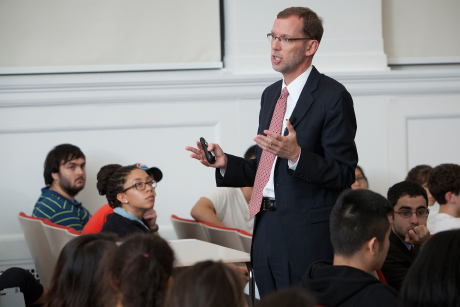Congressional Budget Office director: Spending can't last
By Aaron Coven

Douglas Elmendorf, director of the Congressional Budget Office (CBO), focused on shifting priorities in the federal budget driven by the Affordable Care Act in a Sept. 11 campus talk.
Elmendorf described the CBO as a sort of advisory body dedicated to providing “objective, nonpartisan information for the Congress.” He said the CBO does not recommend or advocate for policies but presents the consequences of their implementation, making “baseline projections, which is what we think will happen to the budget under current law … then the members of Congress have a benchmark to think about the effects of changes in the law.”
While it is difficult to accurately predict the precise outcome of a policy, the CBO’s analysis reflects the “midpoint of the distribution of possible outcomes. We recognize that what we do is very uncertain, and we’re trying to pick estimates in the middle of what might turn out,” Elmendorf said.
He added that there are many challenges with estimating the effects of various pieces of legislation, as the CBO’s computer models have to take into account many variables that impact citizens,’ universities’ and local and state governments’ behavior and decision-making processes.
In discussing the impact of the Affordable Care Act, Elmendorf said that as we look forward to the future state of the budget, we can expect that increased spending on social security, Medicare and Medicaid will account for approximately 85 percent of the projected increase in annual spending over the coming decade. While these three programs make up 45 percent of 2014 mandatory spending, the growth in the portion of the population 65 years of age or older will contribute to their increasing costs as the tax-paying portion of the population is rising slowly.
The Affordable Care Act, Elmendorf said, is all about value-based tradeoffs. While the budget will be largely negatively impacted by this policy – the Affordable Care Act is estimated to be responsible for 60 percent of growth in federal spending over the next 10 years – 26 million more people will be insured. Even with these tradeoffs in mind, Elmendorf noted that the budget’s current track is unsustainable, and that getting back on track will require what he called “significant challenges in policy.”
“We will need to cut benefits from those large programs relative to current law, raise tax revenue” or do both, Elmendorf said. Neither option will be easy, he concluded, noting that proposed changes in policy are often unpopular and “don’t get invited back [to Congress] all the time.”
Elmendorf said his grandfather served as the mayor of Ithaca in 1899, and he has a long line of Cornell graduates in his family.
The talk was sponsored by the Cornell Institute for Public Affairs in the College of Human Ecology.
Aaron Coven ’16 is a writer intern for the Cornell Chronicle.
Media Contact
Get Cornell news delivered right to your inbox.
Subscribe